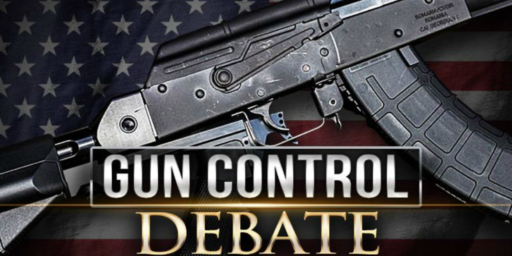Don’t Know Much About History
Pete DuPont is shocked–shocked!–that American college students have a poor knowledge of American history.
Among college seniors, less than half–47.9%–correctly concluded that “We hold these truths to be self evident, that all men are created equal” was from the Declaration of Independence. More than half did not know that the Bill of Rights prohibits the governmental establishment of an official religion, and “55.4 percent could not recognize Yorktown as the battle that brought the American Revolution to an end” (more than one quarter believing that it was the Civil War battle of Gettysburg that had ended the Revolution).
The questions about more recent matters produced more accurate answers. More than 80% of students could identify Franklin D. Roosevelt’s programs as the New Deal, 79% knew that Brown v. Board of Education ordered an end to racial segregation, and 69% were aware that GDP was the best measure of output of our economy.
Like Steven Taylor, I am not surprised by this (I taught college political science for several years) nor am I particularly concerned. As he notes, much of this is essentially trivia. My recollection of the battles of the War for Independence (it wasn’t a revolution, dang it!) and the Civil War is fuzzy at best, although I can differentiate Gettysburg from Yorktown. Frankly, what I do know about those battles is practically useless.
This, too, is not all that surprising:
[There] were 16 schools that showed “negative learning”–that is, seniors scored lower than freshmen. Cornell, UC Berkeley and Johns Hopkins were the worst three, their seniors scoring between 3.3 and 7.3 percentage points worse than their freshmen. And on the negative list were some other very prestigious universities: Williams, Georgetown, Yale, Duke and Brown.
Most students aren’t history majors. The core curriculum courses, including history, tend to be taken freshman year. So, one would expect freshmen to know more than seniors. This is especially true given that many schools allow students to take two semesters of World History or European History rather than American History. That means that the seniors are further away from high school history courses than the freshmen.
More to the point, however, DuPont’s criticism misses the central premise of American higher education. Unlike most educational systems, which emphasize rote learning, ours places a premium on higher order thinking.
For example: Is it really an established fact that GDP is “the best measure of output of our economy”? I’m not an economist but my understanding has long been that the choice of proxies for productivity involved trade-offs and different measures were utilized depending on exactly what one was trying to capture. Regardless, however, this is also trivia in the sense that only a tiny fraction of the 69% could likely tell you the difference between GDP and GNP, let alone how either is calculated. The Why’s are much more important than the What’s in these cases.
I don’t much care whether students can tell me the names of battles or identify which document contains a particular phrase. What’s important is to understand the significance of the War for Independence, the Civil War, economic variables, the civil rights movement, and so forth. We’re not doing as well at this, either, as I’d like. But we’re ahead of most other countries in doing this well for a broad spectrum of society.






The best history course I took in college (possibly the best course bar none) was a course in the 20th century history of Japan. The structure of the course was interesting.
The midterm took place at the end of the first week of class and accounted for 25% of the grade. The midterm was a combination multiple choice, T/F, and fill in the blanks examination of names, dates, places, and events in Japanese history.
The remainder of the class was devoted to classroom discussion. Each week was moderated by a different student and devoted to some particular issue important in the 20th century history of Japan. That accounted for 50% of the grade. A term paper accounted for the last 25%.
The structure of the class was based on the notion that critical thinking requires an understanding of and elementary mastery of facts.
What do you get when you have neither mastery of the facts nor any real training in critical thinking? Point-of-view exercises. The blogosphere.
I would like to see a bit more detail on the question to see if it’s just ignorance of “trivia” or if PC history trivia is being retained while non-PC history trivia is getting short shrift.
I remember in High School where the world history teacher was amazed when I didn’t know the answer to a question in class (What was the significance of the battle of Tannenberg in WWI). I missed one question in all the tests for that class when I compared the internment of Japanese-Americans to Nazi concentration camps. Note that used the word concentration camp and not death camp. Note further that some of the roots of the Nazi concentration camps come from the British actions in the Boer war. So the teachers rejection of my comparison as “We don’t do things like that” wasn’t very convincing to me, but what the hey, I already had a solid A and there are no brownie points differential between a 99.7% and 100% average (at least not back then).
The reason I could answer so much wasn’t study of the class textbooks, but rather I tended to stay awake and focused on the material in all my classes and in the case of World history, my hobby of war gaming meant that I had independently, voluntarily studied about a great swath of world history because I had studied wars, what led up to them, what occurred during them, what occurred after them, technology/political changes before, during and after a war, and how the different wars interrelate. Surprise, but if you cover those things, you have covered most of world history. Certainly to a point of being able to ace a high school world history class.
I think the biggest loss for those who don’t know the “trivia” is they lack context for viewing the current world situation. To understand the similarities and dissimilarities between the meal minute men and “Moore’s minutemen” you need to know some of that trivia. Similarly with the economic examples you gave, knowing the difference between GDP and GNP, the impact of policies that could impact one but not the other, etc. is good context for understanding our political choices.
But the time for a man to be able to read several hundred books and be an expert on all aspects of man’s knowledge has passed us by several centuries ago. We can’t all know every “trivia” in every category. There are those who have orders of magnitude more knowledge about movies, music, celebrities, sports, etc than I have. Like wise there are those who know more “trivia” about quantum mechanics, riparian law, statistics, chemistry, etc than I do. The bottom line is we all pick and choose to a certain degree what “trivia” we will seek out and retain.
BTW, James, thanks for mentioning this:
Have you ever taken a look at the total number of college/higher education seats in Germany or France? It’s appalling.
Civil War?
It was the War of Northern Aggression, dang it!
Couldn’t resist.
Your argument could be carried further. Why do we need any facts (trivia) at all? Why was the Civil War important? Who cares? Why do you need to know your times tables–if you need them, you’ll learn them. A liberal education is supposed to create a student with broad knowledge of many subjects. Students can go to college and master what you call “higher order thinking,†but what do they think about if they have no framework of basic facts-no idea where we came from or how we got here. To paraphrase Michael Crichton, knowing so little about our past, a student is like a leaf that doesn’t know it is part of a tree.
You’re not surprised by this? Come on! I bet you are one of those people who weren’t surprised when the Germans bombed Pearl Harbor, either!
The only reason DuPont is shocked about poor knowledge of American history is that nobody remembers his sorry-ass excuse for a Presidential campaign back in ’88!
Give it up Pete!